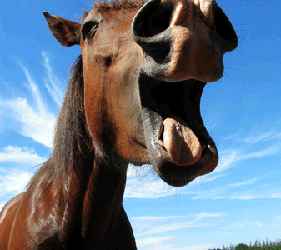Many of you have experienced having your horse suffer from health problems. One of the most common problems is ulcers. I remember three years ago, my 5-year old Chase had ulcers for about 4 weeks and no one ever knew about it. Many of us in the family did not realize that a big percentage of horses can have digestive problems. I was not so sure that time that problems in his GI system could manifest in his behaviors. He was cranky at that time and developed bad habits such as chewing off the fence.
Three years ago, I got a call from the owner of the barn where Chase boarded. He said that Chase had not touched his feed a night before and that appears to be unusual for my horse. Normally, Chase is like a vacuum cleaner – he eats up all his feed and nothing will be left. That’s my Chase – always a lover of food. I visited the barn and Chase looked fine; the vet was not around that time and since I saw that Chase was looking alright, I just shrugged it off. The next day, I saw my horse doing alright – eating normally, drinking and defecating normally. But the next few days, something was just really off. Chase had been seen to be crankier, less jolly, and eating less. Now that’s something new, I thought.
 |
| Your horse can't speak if he's in pain. It's up to you to identify the signs that tell he's not doing fine. |
This alarmed me and prompted me to call on my vet and he suspected that my Chase had ulcers. I didn’t know back then that ulcers in horses are not caused by bacteria or that “backyard” horses like Chase can also be prone to these problems as with many performance horses. So the vet told me that treatment is with the use of equine omeprazole, but obviously, this course of therapy will not be cheap. So I had to consult a friend of mine back in Oklahoma, and she said there are cheaper alternatives. One is by the name of AbPrazole, a granule formulation of the said medication. I gave it a try and after several days of therapy, I find my Chase back in his great shape.
When it comes to digestive problems, your horse is not likely to complain and whine constantly just to express pain. You need to be more observant on the different signs of gastric problems. Do not ignore any changes in appetite or behaviour. Contact your veterinarian and have your horse checked as soon as possible.
No comments:
Post a Comment